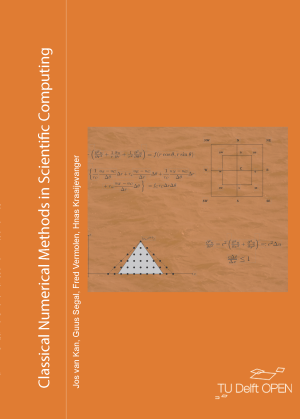Classical Numerical Methods in Scientific Computing
Synopsis
Partial differential equations are paramount in mathematical modelling with applications in engineering and science. The book starts with a crash course on partial differential equations in order to familiarize the reader with fundamental properties such as existence, uniqueness and possibly existing maximum principles. The main topic of the book entails the description of classical numerical methods that are used to approximate the solution of partial differential equations. The focus is on discretization methods such as the finite difference, finite volume and finite element method. The manuscript also makes a short excursion to the solution of large sets of (non)linear algebraic equations that result after application of discretization method to partial differential equations. The book treats the construction of such discretization methods, as well as some error analysis, where it is noted that the error analysis for the finite element method is merely descriptive, rather than rigorous from a mathematical point of view. The last chapters focus on time integration issues for classical time-dependent partial differential equations. After reading the book, the reader should be able to derive finite element methods, to implement the methods and to judge whether the obtained approximations are consistent with the solution to the partial differential equations. The reader will also obtain these skills for the other classical discretization methods. Acquiring such fundamental knowledge will allow the reader to continue studying more advanced methods like meshfree methods, discontinuous Galerkin methods and spectral methods for the approximation of solutions to partial differential equations.
Downloads
References
R.A. Adams. Sobolev Spaces. Academic Press, New York, 1975.
Robert A. Adams. Calculus, a complete course. Fifth Edition. Addison Wesley Longman, Toronto, 2003.
R. Aris. Vectors, Tensors and the Basic Equations of Fluid Mechanics. Prentice-Hall, Inc., Englewood Cliffs, N.J., 1962. Reprinted, Dover, New York, 1989.
R.L. Burden and J.D. Faires. Numerical analysis. Brooks/Cole, Pacific Grove, 2001.
R. Courant and D. Hilbert. Methods of Mathematical Physics, Vol. 2. Partial Differential Equations. Interscience, New York, 1989. https://doi.org/10.1002/9783527617234
C. Cuvelier, A. Segal, and A.A. van Steenhoven. Finite Element Methods and Navier-Stokes Equations. Reidel Publishing Company, Dordrecht, Holland, 1986. https://doi.org/10.1007/978-94-010-9333-0
L.C. Evans. Partial Differential Equations. American Mathematical Society, 2010. https://doi.org/10.1090/gsm/019
J.D. Lambert. Numerical methods in ordinary differential equations. John Wiley, Englewood Cliffs, 1991.
David C. Lay. Linear Algebra and its applications. Addison Wesley, New York, 1993.
A.R. Mitchell and D.F. Griffiths. The Finite Difference Method in Partial Differential Equations. Wiley, Chichester, 1994.
M.H. Protter and H.F. Weinberger. Maximum Principles in Differential Equations. Prentice-Hall, Englewood Cliffs, 1967.
James Stewart. Calculus. Fifth Edition. Brooks/Cole, New York, 2002.
G. Strang. Linear Algebra and its Applications, (third edition). Harcourt Brace Jovanovich, San Diego, 1988.
R. Temam. Navier-Stokes Equations. North-Holland, Amsterdam, 1985.
J. van Kan, A. Segal, and F. Vermolen. Numerical Methods in Scientific Computing, Second Edition. Delft Academic Press, Delft, 2014.

Published
Versions
- 2024-07-29 (2)
- 2023-07-27 (1)



